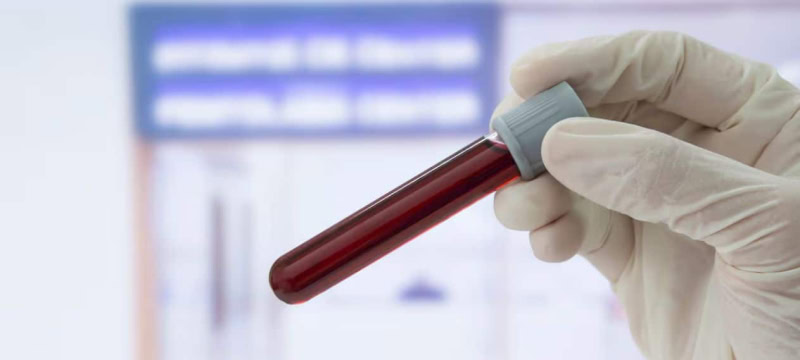A recent study has revealed that a blood test for cognitive decline has a 90% accuracy rate in identifying whether memory loss is due to Alzheimer’s disease. This surpasses the accuracy of neurologists and memory specialists, who correctly diagnose Alzheimer’s 73% of the time, and primary care doctors, who have a 61% success rate.
The blood test includes a component called plasma phosphorylated tau 217 (p-tau217), which is one of several biomarkers being studied for diagnosing mild cognitive impairment and early-stage Alzheimer’s. Dr. Sebastian Palmqvist from Lund University explains that p-tau217 measures tau protein levels, which are significantly elevated in Alzheimer’s disease—more than 8 times higher compared to non-Alzheimer’s elderly individuals.
Read more: NASA’s Perseverance Rover Might Have Found Its Target on Mars
Previous research from January indicated that a similar p-tau217 test could identify elevated levels of beta-amyloid with up to 96% accuracy and tau with up to 97% accuracy. Both beta-amyloid and tau tangles are key indicators of Alzheimer’s.
In the current study, the p-tau217 test was combined with another biomarker, the amyloid 42/40 ratio, which measures amyloid protein levels. This combination, known as the amyloid probability score, proved to be the most predictive.
Dr. Maria Carrillo of the Alzheimer’s Association expressed hope that such a blood test could eventually be used in primary care settings, much like a cholesterol test, to facilitate early and accurate Alzheimer’s diagnosis. She noted that the p-tau217 test is proving to be particularly specific and valid for Alzheimer’s, suggesting it could revolutionize Alzheimer’s research and treatment.
The p-tau217 test works by detecting this peptide only when amyloid plaques are present in the brain, indicating early neuronal damage in Alzheimer’s, but only once amyloid is already detected.
Dr. Maria Carrillo explained that while the blood test for Alzheimer’s disease doesn’t directly measure amyloid plaques, it indicates their presence, confirmed by PET scans. This test is a valuable marker for Alzheimer’s because if amyloid is absent, Alzheimer’s is unlikely. Elevated tau levels, on the other hand, suggest other forms of dementia.
Tau tangles are associated with various neurological disorders, including frontal lobe dementia (FTD). In FTD, tau tangles affect the frontal lobe, leading to behavioral and emotional changes and impairing executive functions like planning. Memory loss in FTD usually occurs at a later stage.
In Alzheimer’s disease, tau tangles accumulate in the memory-related regions of the brain, with amyloid plaques playing a significant role. These plaques can cluster at synapses, disrupting nerve cell communication and potentially causing inflammation through overstimulation of the immune system, which can damage the brain further.
New dementia drugs, such as lecanemab and donanemab, target beta-amyloid but might be less effective in cases with significant tau pathology. Since amyloid deposits can start accumulating in the brain decades before symptoms appear, even in individuals as young as their 30s or 40s, early detection of amyloid could be crucial for making lifestyle changes and starting preventive treatments.

Current screening tests are not definitive
The study, published on Sunday in JAMA Neurology, tracked 1,213 individuals with an average age of 74 who were undergoing cognitive assessments in primary and specialty clinics across Sweden. Each participant’s blood was tested for p-tau217 and combined with measurements of beta-amyloid 40/42 to create a final diagnostic score.
Dr. Richard Isaacson, a preventive neurologist not involved in the study, noted that combining the 40/42 ratio with p-tau217 enhances its diagnostic accuracy.
The 90% accuracy of the blood test was validated through spinal fluid analysis, which, along with amyloid PET scans, remains a gold-standard diagnostic method for Alzheimer’s, aside from autopsy. However, experts say these methods are costly, invasive, and not widely accessible in the U.S..
The study’s blood test results were compared to diagnoses from Swedish primary care doctors and specialists. The relatively low accuracy rates of 61% and 73% reveal the challenges doctors face with current diagnostic tools, which typically include a brief patient interview, a cognitive test, and a CT scan.
Dr. Oskar Hansson, a study co-author and neurology professor at Lund University, explained that traditional tests and digital cognitive assessments often fall short in accurately diagnosing Alzheimer’s. Other conditions, such as vascular dementia, depression, thyroid issues, sleep apnea, and vitamin B12 deficiency, can present similar cognitive symptoms, leading to misdiagnoses.
Dr. Maria Carrillo highlighted that undetected mimicking conditions could delay the diagnosis for those with true Alzheimer’s pathology, causing them to miss out on treatment options.
When will routine blood tests become available?
According to mathematical models that predict the impact of the aging U.S. population, wait times for dementia diagnoses are expected to worsen. By 2033, if primary care doctors rely solely on current cognitive assessments, individuals may wait nearly six years on average to learn if they qualify for new Alzheimer’s treatments, according to a new study presented at the 2024 Alzheimer’s Association International Conference in Philadelphia.
In contrast, accurate blood tests could significantly reduce wait times to six and 13 months, as fewer people would need to see specialists or undergo additional tests.
Despite these promising results, routine blood tests for Alzheimer’s are not expected to become commonplace in primary care offices soon. According to Dr. Richard Isaacson, more research is needed to confirm the findings, establish guidelines for their use, and educate physicians on their application.
Isaacson expressed optimism about the potential of these tests but noted that they are not yet fully definitive. Positive results will still need confirmation through PET scans or spinal taps, and the meaning of borderline results remains unclear.
In the meantime, research suggests that individuals can take several actions to prevent or slow cognitive decline, such as regular exercise, following a Mediterranean-style diet, and managing vascular risk factors like high blood pressure, high cholesterol, and diabetes.
Isaacson emphasized the goal of using high-quality blood tests to facilitate early Alzheimer’s diagnosis and assess the effectiveness of risk-reducing interventions, calling these developments very promising.









